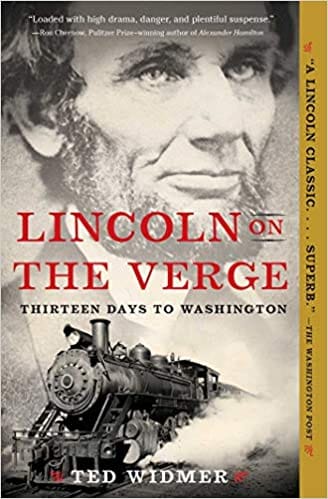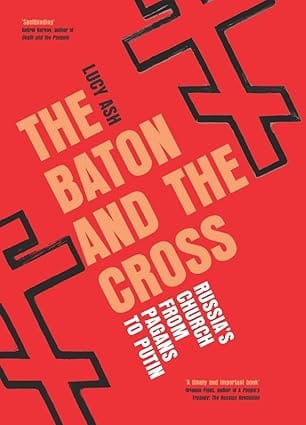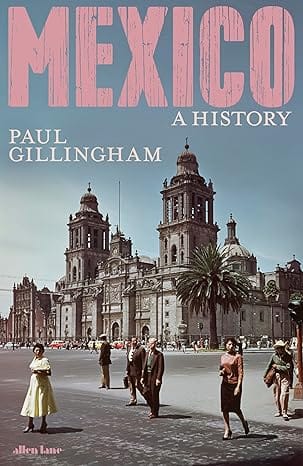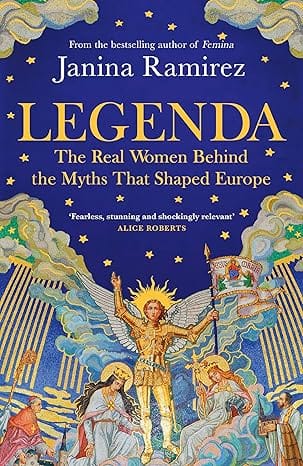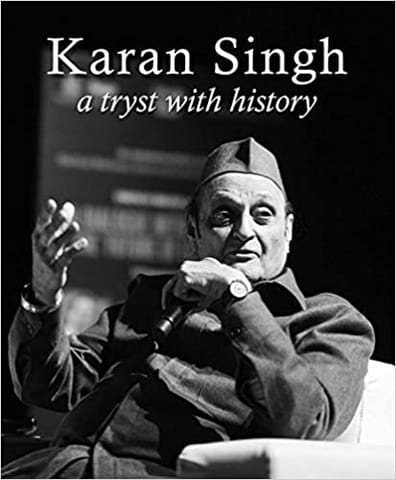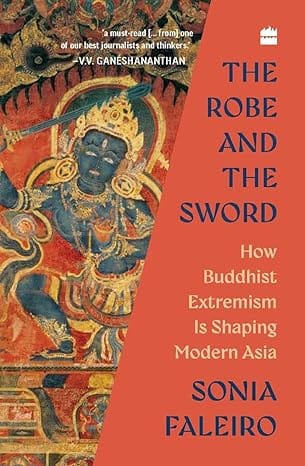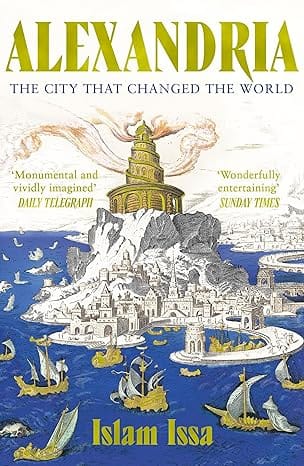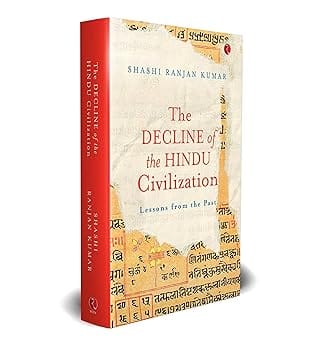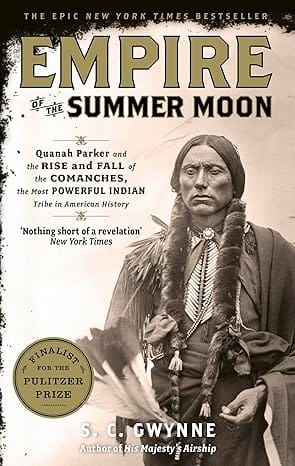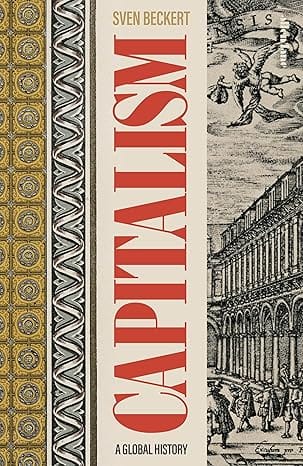- Non-ficton
- Non-ficton
- Contemporary Fiction
- Contemporary Fiction
- Children
- Children
- Comics & Graphic Novels
- Comics & Graphic Novels
- Non-Fiction
- Non-Fiction
- Fiction
- Fiction
WINNER OF THE LINCOLN FORUM BOOK PRIZE
“A Lincoln classic...superb.” —The Washington Post
“A book for our time.”—Doris Kearns Goodwin
Lincoln on the Verge tells the dramatic story of America’s greatest president discovering his own strength to save the Republic.
As a divided nation plunges into the deepest crisis in its history, Abraham Lincoln boards a train for Washington and his inauguration—an inauguration Southerners have vowed to prevent. Lincoln on the Verge charts these pivotal thirteen days of travel, as Lincoln discovers his power, speaks directly to the public, and sees his country up close. Drawing on new research, this riveting account reveals the president-elect as a work in progress, showing him on the verge of greatness, as he foils an assassination attempt, forges an unbreakable bond with the American people, and overcomes formidable obstacles in order to take his oath of office.
Review
—Ron Chernow, Pulitzer-Prize-winning author of Grant and Washington: A Life
"Ted Widmer's Lincoln On the Verge is an impressively vivid and intimate portrait of Abraham Lincoln on his historic 1861 train journey from Illinois to Washington D.C. (where he was sworn-in as America's 16th president). With a deft blend of textured storytelling and fresh research Widmer recounts the widespread uncertainty and fear that consumed the nation on the eve of the Civil War. Highly recommended!"
—Douglas Brinkley, author of Rightful Heritage: Franklin D. Roosevelt and the Land of America
“Lincoln's journey by train from Springfield to Washington in February 1861 was full of drama and tension caused by a nation breaking in two as the president-elect's passage through seven of the largest Northern states helped unify them for the impending struggle even a delegates from seven seceded states met a thousand miles to the south to form the Confederacy and conspirators in Baltimore plotted to assassinate Lincoln as he passed through their city, a conspiracy that was foiled by a secret midnight transit. Ted Widmer's narrative captures the drama and tension with sparkling prose that projects the reader back in time to that fateful journey.”
—James M. McPherson, Pulitzer-Prize-winning author of Battle Cry of Freedom: The Civil War Era
“A positively elegiac account of the most consequential pre-inauguration journey—and pre-presidential public relations offensive—in American history. Lincoln said at the outset that he had a “task greater than” George Washington faced to preserve the Union the founders had created. Ted Widmer has successfully undertaken a great task of his own in crafting a cohesive, dramatic, and ultimately stirring account of the politically fraught, emotionally draining, and physically dangerous voyage that brought Illinois’ favorite son to the nation’s capital in time, and shape, to meet his destiny.”
—Harold Holzer, winner of the Gilder Lehrman Lincoln Prize
“A richly detailed and colorful narrative, Ted Widmer's book is wonderfully readable, and surely the fullest account yet of Lincoln's perilous trip to Washington as President-elect.”
—Douglas L. Wilson, author of Honor's Voice and Lincoln's Sword
“Ted Widmer is one of our best contemporary chroniclers of the American story. He immerses readers in a pivotal moment at the brink of the Civil War, bringing our greatest president to life on the page. And as America now faces another moment of seemingly irreparable disunion, Widmer finds relevance — and even reasons for hope — in the past.”
—Adam Goodheart, author of 1861: The Civil War Awakening
“In a wholly original, gorgeously crafted reimagining, Mr. Widmer portrays Lincoln’s demanding journey as a Homeric odyssey through perilous terrain toward almost preordained immortality....The story of Lincoln’s inaugural journey has never been told in such rich detail....Mr. Widmer brings off his panoramic, almost mystical interpretation with riveting panache. His book is not only a historical achievement but a literary one."
—The Wall Street Journal
“A book about a time of national crisis, in a time of national crisis.”
—The Guardian
“Lincoln buffs will undoubtedly devour the book. A colorful, richly detailed overture to Lincoln’s odyssey.”
—Kirkus Reviews
“Widmer’s exploration of this historical footnote delivers real depth… History buffs will be entertained and enlightened by this unique view of Lincoln and the country on the cusp of war.”
—Publishers Weekly
“At last count there were about 15,000 books on Lincoln, not all of them are worth reading. Lincoln on the Verge is.”
—CBS This Morning
“Widmer’s Lincoln on the Verge is quite simply as good as it gets in the art of writing biography. Besides his thorough research and fast-paced storytelling skills, the author’s deep insights into this tipping-point experience in Lincoln’s life as he traveled to meet his ultimate fate as president charged with the nation-on-his-shoulders responsibility of reuniting the states while acting as commander-in-chief during the most horrific war in American history makes for a saga to be savored.”
—Washington Independent Review of Books
"One of the most fascinating history books of the year thus far."
—The Bowery Boys Podcast
"A Lincoln classic...superb....So much has been written about Abraham Lincoln that it’s rare when a historian discovers an episode in his life that, if fully developed and interpreted, yields important new insights. Ted Widmer has done just that..."
—The Washington Post
"Gripping...evocatively illustrated, and resonant with the kind of leaderly rhetoric and character that sustained the nation—and made it great."
—Harvard Magazine
"Riveting. Enthralling. Rewarding. Take your pick! Ted Widmer has written a history book that jumps from the page."
—Bookreporter.com
About the Author
Excerpt. © Reprinted by permission. All rights reserved.
he drilled
through every plank and fitted them together,
fixing it firm with pegs and fastenings.
As wide as when a man who knows his trade
Marks out the curving hull to build a ship…
—Homer, The Odyssey, book 5, lines 246–2502
NOVEMBER 6, 1860
Abraham Lincoln was in the headquarters of the Illinois & Mississippi Telegraph Company, on the north side of Springfield’s public square, when he received the news that he was likely to win New York, and with it, the presidency.3 It began with a sound—the click-clack of the telegraph key, springing to life as the information raced toward him. A reporter for the New-York Tribune heard the returns begin to “tap in,” audibly, with the first “fragments of intelligence.”4 Then, a flood, as more returns came in from around the country, bringing news as electric as the devices clattering around the room.
All wires led to Springfield that evening, or so it felt to John Hay, who wrote that Lincoln’s room was “the ear of the nation and the hub of the solar system.”5 As dispatchers danced around the suite, Lincoln sat languidly on a sofa, like a spider at the center of an enormous web. That word had already been used to describe the invisible strands connecting Americans through the telegraph.6 Every few minutes, the web twitched again, as an electromagnetic impulse, transmitted from a distant polling station, was transcribed onto a piece of thin paper, like an onion skin, and handed to him.7 Not long after ten, one of these scraps was rushed into his hands. The hastily scribbled message read, “The city of New York will more than meet your expectations.”8
Immediately after, he crossed the square to meet his rapturous supporters, when he was handed another telegram, from Philadelphia. He read it aloud: “The city and state for Lincoln by a decisive majority.” Then he added his all-important commentary: “I think that settles it.” Bedlam ensued.9
Lincoln elected!
It was the headline of the century, and Americans sent it all night long, tapping out the Morse code for Lincoln as quickly as possible: the single long dash, for L, beginning the word that would be repeated endlessly through American history from that night forward. It was already so familiar that many just compressed his name to a single letter, especially when paying to send a telegram. “L and H were elected,” James A. Garfield noted into his diary, omitting needless letters (the H stood for Hannibal Hamlin of Maine, Lincoln’s running mate). “God be praised!!” he wrote when he finally heard the news, wrested from the wires, in a rural Ohio telegraph station. The future president had driven his horse and carriage fifteen miles in the middle of the night, just to be connected.10
In newspaper offices, editors struggled to find type sizes big and bold enough to match the import of what they were hearing. Across the country, crowds stayed up late, hoping to glean new scraps of intelligence from the wires that thrummed with the sensational news. In New Haven, Connecticut, people flat-out screamed for a full ten minutes when the result was announced.11 In Port Huron, Michigan, a thirteen-year-old boy, Thomas Alva Edison, was so eager to get the news that he put his tongue on a wire to receive its electric impulse directly. In Galena, Illinois, young Republicans held a spontaneous “jollification” inside a leather shop, where they were served oysters by the owner’s son, Ulysses Grant. Despite the fact that he leaned toward Democrat Stephen Douglas, the younger Grant seemed “gratified.”12
In Springfield, it seemed like the entire town was out in the streets, as a crowd described as “10,000 crazy people” descended upon the square, “shouting, throwing up their hats, slapping and kicking one another.” The last stragglers went home around dawn, after yelling themselves hoarse.13
But the news did not go to sleep; it traveled all night along the wires that stretched across the oceanic expanse of the United States. The word telegraph derived from Greek, to connote “far writing,” an accurate description of an American grid extending from the frigid wastes of northern Maine to tropical Florida. No one built them more quickly: not far from Troy, Kansas, an English traveler was astonished to see new lines racing across the prairie, six miles closer to the Pacific each day.14
Not everyone had welcomed the clunky overhead lines when they were first introduced; New York City had briefly refused, for fear that “the Lightning,” as the telegraph was called, would attract real lightning.15 The wires were not always reliable in the early years; the news might vanish along the way, due to storms or atmospheric disturbances. A year earlier, at the end of August 1859, an intense solar flare known as the Carrington Event wreaked havoc on the grid, causing flames to shoot out, and machines to turn on and off, as if operated by witches. In a small Pennsylvania town—Gettysburg—a minister recorded his observation of “a mass of streamers,” red and orange, streaking across the sky.”16
In the years leading up to the election, the Lightning had become a part of the republic’s bloodstream. Readers thrilled to the “telegraphic intelligence” that filled newspaper columns, with hard information about stock prices, ship arrivals, and the movements of armies around the world. They also enjoyed news that was not quite news, describing royal birthdays in Europe or the arrival of visiting “celebrities”—to use a term that was coming into vogue to describe people who were known simply for being known.17
But even if the Lightning could race across great distances, it could not bring Americans closer together. Some worried that it was actually driving them apart. In 1858, three days after the first Atlantic Cable connected New York and London, the New York Times asked if the news would become “too fast for the truth?”18 Two years later, as Lincoln ran for the presidency, hateful innuendoes were streaking from one end of the country to another, accelerated by the Lightning.19 Many observed that the first word in the country’s name—United—had become a glaring misnomer. Things got so bad that the Architect of the Capitol, Benjamin Brown French, began to put quotation marks around it.20
Every day, the news made one side or the other angry. In the North, law-abiding citizens were sickened by the never-ending degradation of African-Americans, as the Slave Power stretched its tentacles into the other sections.21 It was one thing to ignore slavery, as many Northerners were perfectly content to do. But when the federal government sent U.S. marshals into free states to find runaways, readers in the free states wondered what had happened to the moral purpose of the republic.22 Southern politicians never stopped asking for more: more slave states, more empire, to encircle the Gulf of Mexico and the Caribbean. In their conclaves, they began to fantasize about a new kind of realm, modeled on the ancient Mediterranean, to be funded by the open plunder of Mexican silver and an inexhaustible supply of Africans.23 That did not sound much like the United States of America.24
But Southerners were no less wary of the news, particularly when they heard about John Brown’s bloody raid on Harpers Ferry or simply read the 1860 census returns that were already coming in. Since 1850, the population of just one state, Lincoln’s Illinois, had shot up more than the combined increase of South Carolina, North Carolina, Georgia, Florida, Alabama, Mississippi, and Virginia. Who were all these people? Were they even American?
Could these two versions of the same country be reconciled? No one would ever expect a thoughtful answer from the White House. It almost seemed as if Buchanan’s regime was leasing the country’s name, as his friends enriched themselves and presided over a machinery of government that was lubricated with bribery, brandy, and insider deals. In New York, a lawyer, George Templeton Strong, wrote in his diary that he felt like he was reliving “the Roman Empire in its day of rotting.”25
Younger Americans, especially, felt estranged. A few years earlier, in Brooklyn, a carpenter had poured out his feelings of rage in a language quite unlike the curious poems he sometimes published at his own expense. Walt Whitman brimmed with anger as he wrote of the “crawling, serpentine men” who held office in Washington, “gaudy outside with gold chains made from the people’s money.”26 The Capitol had turned into a hiding place for nocturnal creatures (“bats and night-dogs”) and swamp-dwellers (“lobbyers, sponges”). Instead of reporting on corruption, the administration’s pet journalists were “spaniels well trained to carry and fetch.” Supplying much of the money was the largest lobby of all, the Slave Power, the “freedom sellers of the earth.” So pervasive was the culture of fear and intimidation that Whitman found an unusual word to describe it: terrorist.27
It was not merely that slavery seemed unstoppable; even more insulting was the fact that the Slave Power now claimed to be the genuine voice of America. It was almost as if the other parts of the story were being erased, as the ink faded a little more from the Declaration of Independence every year. Whitman complained, “Slavery is adopted as an American institution, superior, national, constitutional, right in itself, and under no circumstances to take any less than freedom takes.” The country was being run by “blusterers” and “braggarts,” “screaming in falsetto.” “Where is the real America?” he wondered.28
But even as he despaired, Whitman had a vision of the kind of leader he longed for. In his mind, he imagined a westerner, bearded, speaking words as straight as the prairie grass. Whitman could see him as clearly as if he were already standing before him:
“I would be much pleased to see some heroic, shrewd, full-informed, healthy-bodied, middle-aged, beard-faced American blacksmith or boatman come down from the West across the Alleghanies [sic], and walk into the Presidency, dressed in a clean suit of working attire, and with the tan all over his face, breast, and arms; I would certainly vote for that sort of man.”29
Remarkably, Whitman’s daydream grew real in the spring of 1860, as a new candidate stepped into view. Lincoln did not yet have a beard, but the former boatman fit the poet’s description in almost all other ways. To many easterners, he seemed to have sprung out of the western clay fully formed, with barely any known history. He was unlike anyone who had ever run for president. But could such a strange candidate actually win? Whitman spoke for many: “No man knows what will happen next, but all know that some such things are to happen as mark the greatest moral convulsions of the earth.”30
Even the heavens seemed to portend great change. A little before ten o’clock on the evening of July 20, Americans were astonished to see the skies light up, as a meteor procession flew over the country before exploding in a shower of sparks. The meteors were followed by a long tail, which one observer described as “a great glowing train in the sky.” Another stunned eyewitness called it a “train of fire.” To many, it was a sign of Lincoln’s impending victory, since the meteors originated in the upper Midwest before sweeping over the East.31
On November 6 the Lightning struck quickly. Only four years earlier, it had taken up to ten days for some remote sections of the United States to learn the result of the presidential election. In 1860 Lincoln’s triumph was absorbed in one night. But as the news spread; a second wave of false stories followed closely. The New-York Tribune reported that “gigantic” rumors were spreading like a prairie fire through Lincoln’s Springfield, already fearful for its native son. It was whispered that Washington, D.C., had been set ablaze; slaves were rebelling in Virginia; Jefferson Davis had declared independence for Mississippi; James Buchanan had resigned the presidency; blood was running down the gutters of New York City.32 None of it was true, but the rumors conveyed as well as any fact that democracy had reached a breaking point.33 “God help me, God help me,” Lincoln sighed, as the news finally settled in.34
As he trudged home to his family, with celebrants firing off guns behind him, the president-elect had a great deal to ponder. No doubt a change was coming: he saw two shooting stars on his way home, as if nature, too, wanted to join in the fireworks. The people had spoken, but in so many voices that it would take some time to process what they had said.
The phrase e pluribus unum had been adopted by the founders for the Great Seal of the United States, suggesting a whole greater than the sum of its parts. It rang true when the poet Virgil wrote it, centuries earlier, to describe a pesto he was assembling from cheese, garlic, and parsnips.35 But what if the people proved to be less compatible? In New York, George Templeton Strong confided to his diary that the country would need to change its motto to “e pluribus duo.”36
The lessons of history were hard to ignore. Every democracy ever known had failed, beginning with the Greeks twenty-four centuries earlier. They had succumbed, one by one, to all the well-known vices of the people: corruption, greed, lust, ethnic hatred, distractibility, or simply a fatal indifference.
On his walk home, Lincoln passed a Greek Revival capitol, a Greek Revival courthouse, and a Greek Revival insurance building.37 The persistence of the ancient forms may have offered a momentary comfort—a reminder of the power of an idea to endure. But no underwriter could offer the slightest assurance that government of the people would survive. Even before the night was over, great forces were arrayed against this solitary figure making his way home in the dark.
THE REVOLUTION OF 1860
Far from Springfield, the Lightning continued to do its work. By the time the news sparks had traveled down the wires to the South, they might as well have been a lit fuse. Seven hundred miles away, one of Lincoln’s rivals, Stephen Douglas, was in Mobile, Alabama, where he too heard the results as they tapped into a telegraph key, clacking inside a newspaper office. On the last day of the campaign, he had come down the Alabama River from Selma, after a bruising tour through the South. Douglas was injured in a dockside mishap, taunted by crowds, and targeted by “a shower of eggs.” In a suspicious accident, his train was nearly derailed.39

Two days after Lincoln’s election, the citizens of Savannah held a rally around a bonfire with a flag that read “Don’t Tread on Me”38
It was a lonely crusade for the Illinois Senator, whose friendliness toward the South had once seemed likely to propel him to the White House. As joy was spreading above the Ohio River, rage was fanning out below it, as fast as the Lightning could carry the news. In fact, the Lightning seemed to be part of the problem, as far as Southerners were concerned.40 For many, the speed of modern life was yet another reason to hate the North. It was all too fast—too much information, coming too quickly, from too many people. The New Orleans Bee editorialized, “The election of Abraham Lincoln is a fixed fact. The telegraph made known the disastrous result almost before the expiration of the day on which the contest took place.”41 Another Southern editor harrumphed, “Newspapers and Telegraphs have ruined the country.”42 That was a curious view for a newspaper editor, but Southern opinion shapers had painted Lincoln in such lurid colors before the election that they became unhinged as the result crackled through the wires.
Inside their hothouse, Lincoln was a monster, a tyrant, a would-be dictator—that is, when he was not a weak and vacillating politician, the creature of others. No rumor was too extreme: the Republicans were Communists, they wanted to redistribute wealth, they even shared their wives. Lincoln’s running mate, Hannibal Hamlin, was falsely described as a mulatto; it was said that he “looked, acted, and thought so much like a Negro” that he could be sold as a field hand. A sexual hysteria simmered close to the surface, as Republicans were accused of embracing “free love, free lands, and free Negroes.” Northern newspapers were not above hysteria, either: the New York Herald warned that “hundreds of thousands” of fugitive slaves would come north if Lincoln won, specifically to consummate “African amalgamation with the fair daughters of the Anglo Saxon, Celtic, and Teutonic races.”43
But the worst fear of all was that four million slaves would rise up and slit the throats of their masters if Lincoln won.44 All summer, as the election drew nearer, observers had noticed a rising independence among African-Americans, merely because of the possibility that he might win.
Lincoln On The Verge: Thirteen Days To Washington
SIZE GUIDE
- ISBN :9781476739441
- Author: Ted Widmer
- Publisher: Simon And Schuster
- Pages: 624
- Format: Paperback
Book Description
WINNER OF THE LINCOLN FORUM BOOK PRIZE
“A Lincoln classic...superb.” —The Washington Post
“A book for our time.”—Doris Kearns Goodwin
Lincoln on the Verge tells the dramatic story of America’s greatest president discovering his own strength to save the Republic.
As a divided nation plunges into the deepest crisis in its history, Abraham Lincoln boards a train for Washington and his inauguration—an inauguration Southerners have vowed to prevent. Lincoln on the Verge charts these pivotal thirteen days of travel, as Lincoln discovers his power, speaks directly to the public, and sees his country up close. Drawing on new research, this riveting account reveals the president-elect as a work in progress, showing him on the verge of greatness, as he foils an assassination attempt, forges an unbreakable bond with the American people, and overcomes formidable obstacles in order to take his oath of office.
Review
—Ron Chernow, Pulitzer-Prize-winning author of Grant and Washington: A Life
"Ted Widmer's Lincoln On the Verge is an impressively vivid and intimate portrait of Abraham Lincoln on his historic 1861 train journey from Illinois to Washington D.C. (where he was sworn-in as America's 16th president). With a deft blend of textured storytelling and fresh research Widmer recounts the widespread uncertainty and fear that consumed the nation on the eve of the Civil War. Highly recommended!"
—Douglas Brinkley, author of Rightful Heritage: Franklin D. Roosevelt and the Land of America
“Lincoln's journey by train from Springfield to Washington in February 1861 was full of drama and tension caused by a nation breaking in two as the president-elect's passage through seven of the largest Northern states helped unify them for the impending struggle even a delegates from seven seceded states met a thousand miles to the south to form the Confederacy and conspirators in Baltimore plotted to assassinate Lincoln as he passed through their city, a conspiracy that was foiled by a secret midnight transit. Ted Widmer's narrative captures the drama and tension with sparkling prose that projects the reader back in time to that fateful journey.”
—James M. McPherson, Pulitzer-Prize-winning author of Battle Cry of Freedom: The Civil War Era
“A positively elegiac account of the most consequential pre-inauguration journey—and pre-presidential public relations offensive—in American history. Lincoln said at the outset that he had a “task greater than” George Washington faced to preserve the Union the founders had created. Ted Widmer has successfully undertaken a great task of his own in crafting a cohesive, dramatic, and ultimately stirring account of the politically fraught, emotionally draining, and physically dangerous voyage that brought Illinois’ favorite son to the nation’s capital in time, and shape, to meet his destiny.”
—Harold Holzer, winner of the Gilder Lehrman Lincoln Prize
“A richly detailed and colorful narrative, Ted Widmer's book is wonderfully readable, and surely the fullest account yet of Lincoln's perilous trip to Washington as President-elect.”
—Douglas L. Wilson, author of Honor's Voice and Lincoln's Sword
“Ted Widmer is one of our best contemporary chroniclers of the American story. He immerses readers in a pivotal moment at the brink of the Civil War, bringing our greatest president to life on the page. And as America now faces another moment of seemingly irreparable disunion, Widmer finds relevance — and even reasons for hope — in the past.”
—Adam Goodheart, author of 1861: The Civil War Awakening
“In a wholly original, gorgeously crafted reimagining, Mr. Widmer portrays Lincoln’s demanding journey as a Homeric odyssey through perilous terrain toward almost preordained immortality....The story of Lincoln’s inaugural journey has never been told in such rich detail....Mr. Widmer brings off his panoramic, almost mystical interpretation with riveting panache. His book is not only a historical achievement but a literary one."
—The Wall Street Journal
“A book about a time of national crisis, in a time of national crisis.”
—The Guardian
“Lincoln buffs will undoubtedly devour the book. A colorful, richly detailed overture to Lincoln’s odyssey.”
—Kirkus Reviews
“Widmer’s exploration of this historical footnote delivers real depth… History buffs will be entertained and enlightened by this unique view of Lincoln and the country on the cusp of war.”
—Publishers Weekly
“At last count there were about 15,000 books on Lincoln, not all of them are worth reading. Lincoln on the Verge is.”
—CBS This Morning
“Widmer’s Lincoln on the Verge is quite simply as good as it gets in the art of writing biography. Besides his thorough research and fast-paced storytelling skills, the author’s deep insights into this tipping-point experience in Lincoln’s life as he traveled to meet his ultimate fate as president charged with the nation-on-his-shoulders responsibility of reuniting the states while acting as commander-in-chief during the most horrific war in American history makes for a saga to be savored.”
—Washington Independent Review of Books
"One of the most fascinating history books of the year thus far."
—The Bowery Boys Podcast
"A Lincoln classic...superb....So much has been written about Abraham Lincoln that it’s rare when a historian discovers an episode in his life that, if fully developed and interpreted, yields important new insights. Ted Widmer has done just that..."
—The Washington Post
"Gripping...evocatively illustrated, and resonant with the kind of leaderly rhetoric and character that sustained the nation—and made it great."
—Harvard Magazine
"Riveting. Enthralling. Rewarding. Take your pick! Ted Widmer has written a history book that jumps from the page."
—Bookreporter.com
About the Author
Excerpt. © Reprinted by permission. All rights reserved.
he drilled
through every plank and fitted them together,
fixing it firm with pegs and fastenings.
As wide as when a man who knows his trade
Marks out the curving hull to build a ship…
—Homer, The Odyssey, book 5, lines 246–2502
NOVEMBER 6, 1860
Abraham Lincoln was in the headquarters of the Illinois & Mississippi Telegraph Company, on the north side of Springfield’s public square, when he received the news that he was likely to win New York, and with it, the presidency.3 It began with a sound—the click-clack of the telegraph key, springing to life as the information raced toward him. A reporter for the New-York Tribune heard the returns begin to “tap in,” audibly, with the first “fragments of intelligence.”4 Then, a flood, as more returns came in from around the country, bringing news as electric as the devices clattering around the room.
All wires led to Springfield that evening, or so it felt to John Hay, who wrote that Lincoln’s room was “the ear of the nation and the hub of the solar system.”5 As dispatchers danced around the suite, Lincoln sat languidly on a sofa, like a spider at the center of an enormous web. That word had already been used to describe the invisible strands connecting Americans through the telegraph.6 Every few minutes, the web twitched again, as an electromagnetic impulse, transmitted from a distant polling station, was transcribed onto a piece of thin paper, like an onion skin, and handed to him.7 Not long after ten, one of these scraps was rushed into his hands. The hastily scribbled message read, “The city of New York will more than meet your expectations.”8
Immediately after, he crossed the square to meet his rapturous supporters, when he was handed another telegram, from Philadelphia. He read it aloud: “The city and state for Lincoln by a decisive majority.” Then he added his all-important commentary: “I think that settles it.” Bedlam ensued.9
Lincoln elected!
It was the headline of the century, and Americans sent it all night long, tapping out the Morse code for Lincoln as quickly as possible: the single long dash, for L, beginning the word that would be repeated endlessly through American history from that night forward. It was already so familiar that many just compressed his name to a single letter, especially when paying to send a telegram. “L and H were elected,” James A. Garfield noted into his diary, omitting needless letters (the H stood for Hannibal Hamlin of Maine, Lincoln’s running mate). “God be praised!!” he wrote when he finally heard the news, wrested from the wires, in a rural Ohio telegraph station. The future president had driven his horse and carriage fifteen miles in the middle of the night, just to be connected.10
In newspaper offices, editors struggled to find type sizes big and bold enough to match the import of what they were hearing. Across the country, crowds stayed up late, hoping to glean new scraps of intelligence from the wires that thrummed with the sensational news. In New Haven, Connecticut, people flat-out screamed for a full ten minutes when the result was announced.11 In Port Huron, Michigan, a thirteen-year-old boy, Thomas Alva Edison, was so eager to get the news that he put his tongue on a wire to receive its electric impulse directly. In Galena, Illinois, young Republicans held a spontaneous “jollification” inside a leather shop, where they were served oysters by the owner’s son, Ulysses Grant. Despite the fact that he leaned toward Democrat Stephen Douglas, the younger Grant seemed “gratified.”12
In Springfield, it seemed like the entire town was out in the streets, as a crowd described as “10,000 crazy people” descended upon the square, “shouting, throwing up their hats, slapping and kicking one another.” The last stragglers went home around dawn, after yelling themselves hoarse.13
But the news did not go to sleep; it traveled all night along the wires that stretched across the oceanic expanse of the United States. The word telegraph derived from Greek, to connote “far writing,” an accurate description of an American grid extending from the frigid wastes of northern Maine to tropical Florida. No one built them more quickly: not far from Troy, Kansas, an English traveler was astonished to see new lines racing across the prairie, six miles closer to the Pacific each day.14
Not everyone had welcomed the clunky overhead lines when they were first introduced; New York City had briefly refused, for fear that “the Lightning,” as the telegraph was called, would attract real lightning.15 The wires were not always reliable in the early years; the news might vanish along the way, due to storms or atmospheric disturbances. A year earlier, at the end of August 1859, an intense solar flare known as the Carrington Event wreaked havoc on the grid, causing flames to shoot out, and machines to turn on and off, as if operated by witches. In a small Pennsylvania town—Gettysburg—a minister recorded his observation of “a mass of streamers,” red and orange, streaking across the sky.”16
In the years leading up to the election, the Lightning had become a part of the republic’s bloodstream. Readers thrilled to the “telegraphic intelligence” that filled newspaper columns, with hard information about stock prices, ship arrivals, and the movements of armies around the world. They also enjoyed news that was not quite news, describing royal birthdays in Europe or the arrival of visiting “celebrities”—to use a term that was coming into vogue to describe people who were known simply for being known.17
But even if the Lightning could race across great distances, it could not bring Americans closer together. Some worried that it was actually driving them apart. In 1858, three days after the first Atlantic Cable connected New York and London, the New York Times asked if the news would become “too fast for the truth?”18 Two years later, as Lincoln ran for the presidency, hateful innuendoes were streaking from one end of the country to another, accelerated by the Lightning.19 Many observed that the first word in the country’s name—United—had become a glaring misnomer. Things got so bad that the Architect of the Capitol, Benjamin Brown French, began to put quotation marks around it.20
Every day, the news made one side or the other angry. In the North, law-abiding citizens were sickened by the never-ending degradation of African-Americans, as the Slave Power stretched its tentacles into the other sections.21 It was one thing to ignore slavery, as many Northerners were perfectly content to do. But when the federal government sent U.S. marshals into free states to find runaways, readers in the free states wondered what had happened to the moral purpose of the republic.22 Southern politicians never stopped asking for more: more slave states, more empire, to encircle the Gulf of Mexico and the Caribbean. In their conclaves, they began to fantasize about a new kind of realm, modeled on the ancient Mediterranean, to be funded by the open plunder of Mexican silver and an inexhaustible supply of Africans.23 That did not sound much like the United States of America.24
But Southerners were no less wary of the news, particularly when they heard about John Brown’s bloody raid on Harpers Ferry or simply read the 1860 census returns that were already coming in. Since 1850, the population of just one state, Lincoln’s Illinois, had shot up more than the combined increase of South Carolina, North Carolina, Georgia, Florida, Alabama, Mississippi, and Virginia. Who were all these people? Were they even American?
Could these two versions of the same country be reconciled? No one would ever expect a thoughtful answer from the White House. It almost seemed as if Buchanan’s regime was leasing the country’s name, as his friends enriched themselves and presided over a machinery of government that was lubricated with bribery, brandy, and insider deals. In New York, a lawyer, George Templeton Strong, wrote in his diary that he felt like he was reliving “the Roman Empire in its day of rotting.”25
Younger Americans, especially, felt estranged. A few years earlier, in Brooklyn, a carpenter had poured out his feelings of rage in a language quite unlike the curious poems he sometimes published at his own expense. Walt Whitman brimmed with anger as he wrote of the “crawling, serpentine men” who held office in Washington, “gaudy outside with gold chains made from the people’s money.”26 The Capitol had turned into a hiding place for nocturnal creatures (“bats and night-dogs”) and swamp-dwellers (“lobbyers, sponges”). Instead of reporting on corruption, the administration’s pet journalists were “spaniels well trained to carry and fetch.” Supplying much of the money was the largest lobby of all, the Slave Power, the “freedom sellers of the earth.” So pervasive was the culture of fear and intimidation that Whitman found an unusual word to describe it: terrorist.27
It was not merely that slavery seemed unstoppable; even more insulting was the fact that the Slave Power now claimed to be the genuine voice of America. It was almost as if the other parts of the story were being erased, as the ink faded a little more from the Declaration of Independence every year. Whitman complained, “Slavery is adopted as an American institution, superior, national, constitutional, right in itself, and under no circumstances to take any less than freedom takes.” The country was being run by “blusterers” and “braggarts,” “screaming in falsetto.” “Where is the real America?” he wondered.28
But even as he despaired, Whitman had a vision of the kind of leader he longed for. In his mind, he imagined a westerner, bearded, speaking words as straight as the prairie grass. Whitman could see him as clearly as if he were already standing before him:
“I would be much pleased to see some heroic, shrewd, full-informed, healthy-bodied, middle-aged, beard-faced American blacksmith or boatman come down from the West across the Alleghanies [sic], and walk into the Presidency, dressed in a clean suit of working attire, and with the tan all over his face, breast, and arms; I would certainly vote for that sort of man.”29
Remarkably, Whitman’s daydream grew real in the spring of 1860, as a new candidate stepped into view. Lincoln did not yet have a beard, but the former boatman fit the poet’s description in almost all other ways. To many easterners, he seemed to have sprung out of the western clay fully formed, with barely any known history. He was unlike anyone who had ever run for president. But could such a strange candidate actually win? Whitman spoke for many: “No man knows what will happen next, but all know that some such things are to happen as mark the greatest moral convulsions of the earth.”30
Even the heavens seemed to portend great change. A little before ten o’clock on the evening of July 20, Americans were astonished to see the skies light up, as a meteor procession flew over the country before exploding in a shower of sparks. The meteors were followed by a long tail, which one observer described as “a great glowing train in the sky.” Another stunned eyewitness called it a “train of fire.” To many, it was a sign of Lincoln’s impending victory, since the meteors originated in the upper Midwest before sweeping over the East.31
On November 6 the Lightning struck quickly. Only four years earlier, it had taken up to ten days for some remote sections of the United States to learn the result of the presidential election. In 1860 Lincoln’s triumph was absorbed in one night. But as the news spread; a second wave of false stories followed closely. The New-York Tribune reported that “gigantic” rumors were spreading like a prairie fire through Lincoln’s Springfield, already fearful for its native son. It was whispered that Washington, D.C., had been set ablaze; slaves were rebelling in Virginia; Jefferson Davis had declared independence for Mississippi; James Buchanan had resigned the presidency; blood was running down the gutters of New York City.32 None of it was true, but the rumors conveyed as well as any fact that democracy had reached a breaking point.33 “God help me, God help me,” Lincoln sighed, as the news finally settled in.34
As he trudged home to his family, with celebrants firing off guns behind him, the president-elect had a great deal to ponder. No doubt a change was coming: he saw two shooting stars on his way home, as if nature, too, wanted to join in the fireworks. The people had spoken, but in so many voices that it would take some time to process what they had said.
The phrase e pluribus unum had been adopted by the founders for the Great Seal of the United States, suggesting a whole greater than the sum of its parts. It rang true when the poet Virgil wrote it, centuries earlier, to describe a pesto he was assembling from cheese, garlic, and parsnips.35 But what if the people proved to be less compatible? In New York, George Templeton Strong confided to his diary that the country would need to change its motto to “e pluribus duo.”36
The lessons of history were hard to ignore. Every democracy ever known had failed, beginning with the Greeks twenty-four centuries earlier. They had succumbed, one by one, to all the well-known vices of the people: corruption, greed, lust, ethnic hatred, distractibility, or simply a fatal indifference.
On his walk home, Lincoln passed a Greek Revival capitol, a Greek Revival courthouse, and a Greek Revival insurance building.37 The persistence of the ancient forms may have offered a momentary comfort—a reminder of the power of an idea to endure. But no underwriter could offer the slightest assurance that government of the people would survive. Even before the night was over, great forces were arrayed against this solitary figure making his way home in the dark.
THE REVOLUTION OF 1860
Far from Springfield, the Lightning continued to do its work. By the time the news sparks had traveled down the wires to the South, they might as well have been a lit fuse. Seven hundred miles away, one of Lincoln’s rivals, Stephen Douglas, was in Mobile, Alabama, where he too heard the results as they tapped into a telegraph key, clacking inside a newspaper office. On the last day of the campaign, he had come down the Alabama River from Selma, after a bruising tour through the South. Douglas was injured in a dockside mishap, taunted by crowds, and targeted by “a shower of eggs.” In a suspicious accident, his train was nearly derailed.39

Two days after Lincoln’s election, the citizens of Savannah held a rally around a bonfire with a flag that read “Don’t Tread on Me”38
It was a lonely crusade for the Illinois Senator, whose friendliness toward the South had once seemed likely to propel him to the White House. As joy was spreading above the Ohio River, rage was fanning out below it, as fast as the Lightning could carry the news. In fact, the Lightning seemed to be part of the problem, as far as Southerners were concerned.40 For many, the speed of modern life was yet another reason to hate the North. It was all too fast—too much information, coming too quickly, from too many people. The New Orleans Bee editorialized, “The election of Abraham Lincoln is a fixed fact. The telegraph made known the disastrous result almost before the expiration of the day on which the contest took place.”41 Another Southern editor harrumphed, “Newspapers and Telegraphs have ruined the country.”42 That was a curious view for a newspaper editor, but Southern opinion shapers had painted Lincoln in such lurid colors before the election that they became unhinged as the result crackled through the wires.
Inside their hothouse, Lincoln was a monster, a tyrant, a would-be dictator—that is, when he was not a weak and vacillating politician, the creature of others. No rumor was too extreme: the Republicans were Communists, they wanted to redistribute wealth, they even shared their wives. Lincoln’s running mate, Hannibal Hamlin, was falsely described as a mulatto; it was said that he “looked, acted, and thought so much like a Negro” that he could be sold as a field hand. A sexual hysteria simmered close to the surface, as Republicans were accused of embracing “free love, free lands, and free Negroes.” Northern newspapers were not above hysteria, either: the New York Herald warned that “hundreds of thousands” of fugitive slaves would come north if Lincoln won, specifically to consummate “African amalgamation with the fair daughters of the Anglo Saxon, Celtic, and Teutonic races.”43
But the worst fear of all was that four million slaves would rise up and slit the throats of their masters if Lincoln won.44 All summer, as the election drew nearer, observers had noticed a rising independence among African-Americans, merely because of the possibility that he might win.
User reviews
NEWSLETTER
Subscribe to get Email Updates!
Thanks for subscribing.
Your response has been recorded.

India's Iconic & Independent Book Store offering a vast selection of books across a variety of genres Since 1978.
"We Believe In The Power of Books" Our mission is to make books accessible to everyone, and to cultivate a culture of reading and learning. We strive to provide a wide range of books, from classic literature, sci-fi and fantasy, to graphic novels, biographies and self-help books, so that everyone can find something to read.
Whether you’re looking for your next great read, a gift for someone special, or just browsing, Midland is here to make your book-buying experience easy and enjoyable.
We are shipping pan India and across the world.
For Bulk Order / Corporate Gifting
 +91 9818282497 |
+91 9818282497 |  [email protected]
[email protected]
Click To Know More
QUICK LINKS
ADDRESS
Shop No.20, Aurobindo Palace Market, Near Church, New Delhi

